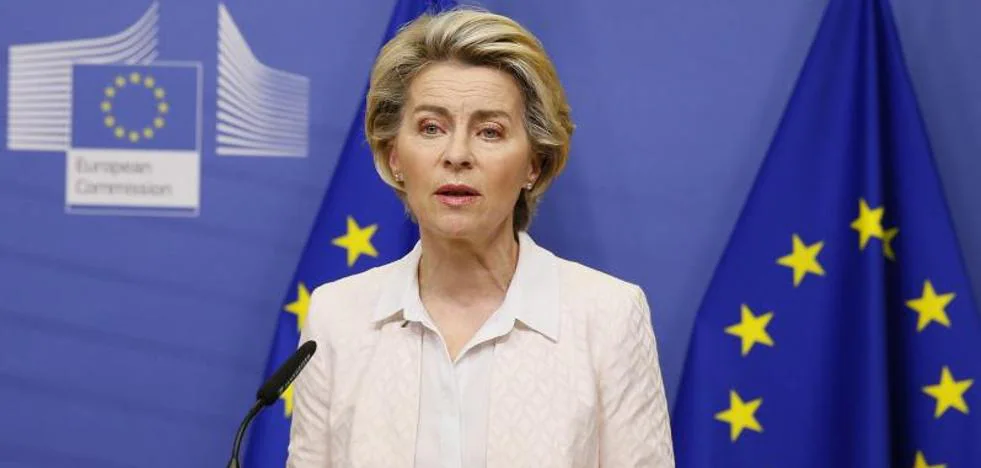The probability of an agreement between the European Union and the United Kingdom is higher after the telephone dialogue held this Saturday by British Prime Minister Boris Johnson with the President of the European Commission, Ursula von der Leyen, led both to ask the negotiating teams headed by David Frost and Michel Barnier to meet again this Sunday.
Their joint communiqué notes that divergences persist in the same areas that have been mentioned for eight months: fishing, fair competition mechanisms and governance of the agreement. But Britain’s refusal to extend the transition deadline beyond December 31 means that, whether or not there is agreement on the future relationship, sweeping changes will take effect in 25 days.
The most visible transformation will affect the transport of goods. Through roads, trains and ports, trade gives EU countries a surplus of around € 100 billion with the UK, whose economy is stronger in services. The more than possible slowdown of the movement in customs will cause damage to both parties.
THE KEYS:
- Dialogue to the end.
-
The European leader and the premier urge the delegations to meet this Sunday in Brussels
- Lack of infrastructure.
-
Fear that perishable products will spoil in ports due to delays in procedures
If there is no agreement, the traffic jams will be greater because shipments in both directions will have to pay new duties. But they already seem inevitable because of the EU’s decision to apply customs controls from 1 January and because of the apparent lack of preparation on the British side to respond to the consequences of the decision taken in the 2016 referendum.
“We are very concerned”, says Ignacio Doménech, president of Agromark, a family business in Torre-Pacheco (Murcia), which exports half of its production (broccoli, cavolo nero, kale, …) to large supermarket chains in the United Kingdom , with a turnover of 44 million euros. That commercial relationship born in 1984 is now shaken by uncertainty.
Two customers load the product directly at the Agromark facilities, which in turn has created an import company in the United Kingdom to manage the transport and delivery to its destination for two other customers. In the round trip itinerary common to both operations, the existence of queues can affect the fresh product. If traffic jams are extensive, the circuit may run out of trucks.
His clients, large British companies, have informed Doménech that, although the public ambition is for the treaty to include the maintenance of a trade in goods without quotas or tariffs, they believe there will be customs tariffs. It has had to deposit 600,000 euros with the British Treasury as collateral to operate in the coming months.
Asymmetry
London published in October the document that describes the operation of its customs in the first months of 2021, with special attention to the port of Dover, through which 10,000 trucks transit daily. It warns that “the requirements of the EU states will largely determine whether the flow of goods is disturbed.” But the House of Commons Public Accounts Committee said this week doubts about the level of preparation in your ports.
Exporters will have to electronically register customs, tariff or VAT declarations, in some new cases, to cross the English Channel. 45 information posts have been created at gas stations or truck parks and waiting areas to decongest the border. A highway line will be cleared for rapid transit of perishable goods such as fish.
Complication of procedures
The provisional regime for the entry of goods into the United Kingdom will allow to defer declarations and the payment of duties or VAT until June. Phytosanitary controls on food or live animals will also be delayed for six months. Carriers will have to obtain a certificate from a website to enter the Kent region, where Dover is located.
United Kingdom produces 61% of its food and imports about 50,000 million annually of the EU. It is a good business for Spain, whose food and beverage sector was, according to ICEX figures, the largest exporter in the first six months of this year, more than 2,500 million.
Manuel Perezcarro, secretary general of Froet, a federation of transport organizations and companies in Murcia, is also concerned. “The driver is going to have to run an office,” he says. He fears a revert to a licensing system for each trip. In a region with some of the largest refrigerated transport companies in Spain, with two thousand trucks, and the majority smaller, with perhaps five, some consider giving up the British island, already problematic in recent years due to the risk and cost of stowaways.
Michael Velasco, born in the United Kingdom, the son of a Republican exile, is president of Rodanto, a British company founded in 1952 by Canarian shareholders to import tomatoes. It introduced aubergine in the ‘British’ diet in 1960. It now has a new shareholding and is present in Murcia (Terra Agrícola), Italy and South Africa. “He believes that logistics will have problems that will affect groupage transport (various loads) more than full load transport, and also Spanish companies that do not have British headquarters.
– .


